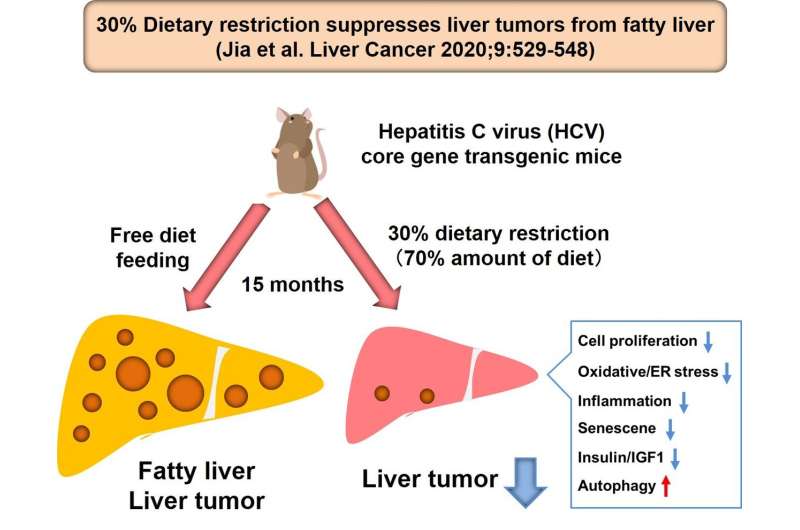30% dietary restriction suppresses liver tumors from fatty liver. Credit: Naoki Tanaka, Research Center for Social Systems, Shinshu University, Japan
Liver cancer from too much fat accumulation in the liver has been increasing in many countries including Japan. In order to change this unfortunate state of affairs, it is important to improve the prognosis of non-alcoholic fatty liver disease. Most often the cause of fatty liver is overeating and lack of exercise. Fatty liver is often improved through eating less, getting more exercise, and reducing body weight. Therefore, the research group led by Shinshu University graduate student Fangping Jia posed the question, "Can eating less also suppress liver cancer caused by fatty liver?"
An international research team led by Shinshu University School of Medicine were able to show that reducing food intake by 30%, or eating until you are just 70% full is effective in reducing the likelihood of developing liver cancer from fatty liver. Fatty liver is a very common disease that can lead to liver cirrhosis and cancer. The team observed the incidence of fatty liver-related liver tumors in mice with the hepatitis C virus core gene and demonstrated the fall in the occurrence of liver cancer from 41% to 8% over a 15 month period, simply through dietary restriction.
Although there have been studies that showed the connection between obesity, fatty liver and hepatocellular carcinoma, the impact and mechanism of dietary restriction on cancer was not well understood before this study. Reducing food intake suppresses cell proliferation, oxidative/ER stress, inflammation, senescence and insulin signaling while increasing autophagy. Inflammation and oxidative/ER stress creates an environment in the body that is conducive to the development of abnormal cells. Autophagy is the mechanism in which the body cleans out damaged cells, reducing the likelihood of developing cancer.
Shinshu University School of Medicine Associate Professor Naoki Tanaka, corresponding author of the study hopes to eradicate liver cirrhosis and cancer from fatty liver through providing personalized dietary guidance and the promotion of the eating habit until you are just 70% full. In three other studies conducted by Associate Professor Tanaka using the same mouse model, the effect of the diet rich in cholesterol, saturated fats and trans-fats were shown to increase the incidence of liver tumors and elucidated the mechanism in which this occurs. Associate Professor Tanaka speculates that not only does the amount of fat intake matter, but the "quality" of dietary fats that lead to cancer. He hopes to elucidate this further in future studies.
Many previous studies have also shown that dietary restriction delayed the progression of cancer in humans through slowing down the rate of aging. There is a Chinese proverb that says, "to live a long and healthy life, eat until the stomach is 70 percent full." Then you will live healthy, and it might lead to longevity.
More information: Fangping Jia et al, Dietary Restriction Suppresses Steatosis-Associated Hepatic Tumorigenesis in Hepatitis C Virus Core Gene Transgenic Mice, Liver Cancer (2020). DOI: 10.1159/000508308
Provided by Shinshu University























